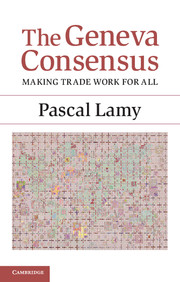Book contents
- Frontmatter
- Contents
- Preface
- 1 Harnessing globalization amid the crisis facing multilateralism
- 2 The changing face of trade
- 3 Helping the poorest up the prosperity ladder
- 4 Trade: friend not foe of the environment
- 5 Trading towards global food security
- 6 Trade can contribute towards better health
- 7 Trade and labour: separated at birth, but still connected
- 8 Trade and energy: the case for a greater WTO role
- 9 Trade and currencies: trading community seeks greater currency stability
- 10 Trade and competition: fairer competition makes for fairer trade
- 11 Trade and human rights: a case of misplaced suspicion
- 12 Corruption: a cancer that trade transparency can help to treat
- 13 Last but not least: the Doha Round
- Epilogue
- Index
10 - Trade and competition: fairer competition makes for fairer trade
Published online by Cambridge University Press: 18 December 2013
- Frontmatter
- Contents
- Preface
- 1 Harnessing globalization amid the crisis facing multilateralism
- 2 The changing face of trade
- 3 Helping the poorest up the prosperity ladder
- 4 Trade: friend not foe of the environment
- 5 Trading towards global food security
- 6 Trade can contribute towards better health
- 7 Trade and labour: separated at birth, but still connected
- 8 Trade and energy: the case for a greater WTO role
- 9 Trade and currencies: trading community seeks greater currency stability
- 10 Trade and competition: fairer competition makes for fairer trade
- 11 Trade and human rights: a case of misplaced suspicion
- 12 Corruption: a cancer that trade transparency can help to treat
- 13 Last but not least: the Doha Round
- Epilogue
- Index
Summary
On a trip to India in 2010, a senior representative of a local company with global reach complained bitterly to me about how his firm was suffering from unfair and collusive business practices at the hands of its raw material suppliers. Essentially he was accusing his upstream partners – who I won’t name – of manipulating supplies and prices to their advantage and his company’s cost. What he was complaining about was a classic case of anti-competitive business practice – something that, unfortunately, is far from rare.
As EU Trade Commissioner, I had fought to have negotiations on a competition agreement added to the Doha Round agenda because I believed – as I still believe – that open trade requires fair and transparent policies on competition. But for reasons that will be discussed, developing countries rejected the call at the time and competition policy was, subsequently, excluded from the Round. International trade, however, is changing and, with it, the needs and demands of developing countries, as the case of the businessman from India shows. So the time has come, I would argue, for the WTO to revisit an issue that has important implications for policy coherence and global trade governance.
- Type
- Chapter
- Information
- The Geneva ConsensusMaking Trade Work for All, pp. 131 - 145Publisher: Cambridge University PressPrint publication year: 2013



